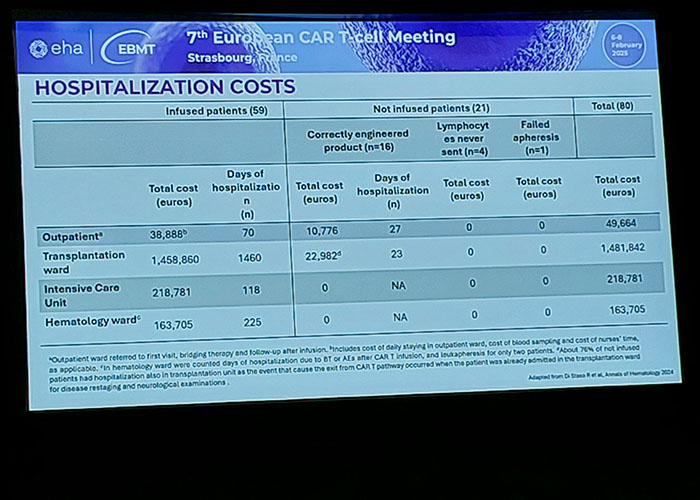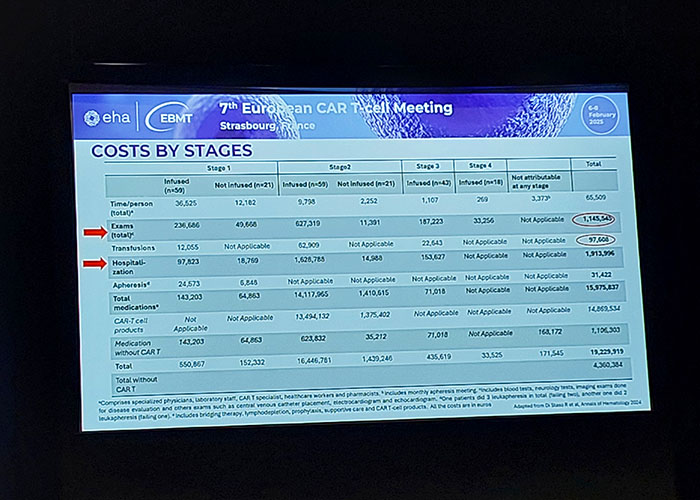Chimeric Antigen Receptor T-cell (CAR-T) therapy is a groundbreaking treatment for certain cancers, particularly some types of lymphomas and leukemias and Myelomas. However, its high cost can be a significant concern for patients.
Total Cost of CAR-T Therapy:
The overall expense of CAR-T therapy encompasses several components:
- Drug Acquisition: The CAR-T cell products alone are priced between $373,000 and $475,000 per infusion.
- Hospitalization and Care: Additional costs, including hospital stays, management of side effects, and supportive care, can bring the total treatment cost to approximately $500,000 to $1,000,000.

Photo: European CAR-T conference 2025. Strasbourg, France.
Insurance Coverage and Out-of-Pocket Expenses:
Insurance coverage for CAR-T therapy varies:
- Private Insurance: Many private insurers cover CAR-T therapy, but coverage can differ, and patients may still face significant out-of-pocket expenses.
- Medicare: Medicare provides coverage for CAR-T therapy, but patients are responsible for deductibles and co-payments.
- Medicaid: Coverage varies by state, and not all state Medicaid programs cover CAR-T therapy.
Even with insurance, patients may incur substantial out-of-pocket costs, including co-pays, deductibles, and expenses related to travel and lodging if treatment is sought far from home.
Financial Assistance Programs:
To help manage these costs, several resources are available:
- Pharmaceutical Assistance: Some drug manufacturers offer programs to assist with the cost of CAR-T therapies.
- Nonprofit Organizations: Groups like the Leukemia & Lymphoma Society provide financial aid for treatment-related expenses.
- Clinical Trials: Participating in clinical trials may offer access to CAR-T therapy at reduced costs.

Photo: European CAR-T conference 2025. Strasbourg, France.
Recommendations for Patients:
- Consult Your Insurance Provider: Clarify what aspects of CAR-T therapy are covered and identify potential out-of-pocket costs.
- Explore Financial Assistance: Investigate programs offered by pharmaceutical companies and nonprofits that may alleviate financial burdens.
- Consider Treatment Location: Factor in travel and lodging expenses, especially if treatment centers are distant.
- Engage with Financial Counselors: Many treatment centers have financial counselors to help navigate insurance and assistance options.
Understanding the financial implications of CAR-T therapy is crucial. Proactive planning and utilizing available resources can help manage the significant costs associated with this innovative treatment.
Affordable, High-Quality CAR-T Therapy in Israel
For patients seeking more affordable options without compromising on quality, Israel has emerged as a leading destination for CAR-T therapy. The country offers advanced medical care with short waiting times, internationally recognized expertise, and a strong track record of success in treating international patients.
Costs in Israel are significantly lower than in the U.S.—often less than half—while maintaining Western standards of safety and effectiveness. Patients benefit from transparent pricing, experienced medical teams, and support throughout their treatment journey, making Israel a compelling option for those facing high out-of-pocket expenses elsewhere.
Publication date: April 2025
Sources:
pmc.ncbi.nlm.nih.gov
webmd.com
academic.oup.com
webmd.com
mayoclinic.org
accc-cancer.org
onclive.com
zs.com










